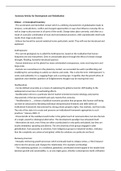Samenvatting
All Articles Summary - Development and Globalization
Summary of all the articles for Development and Globalization: Eriksen; Winther & Wilhite; Jackson; Cardoso; Eriksen; Pieterse; Ferguson; Persson; De Soto; Li; Koch; Eriksen; Larhiri-Dutt; Gamu; Hogenboom & De Thije; Sen; Ferguson; Marysse & Geenen; Fisher; Ferguson & Li; Mosse; Kirsch; Li
[Meer zien]




